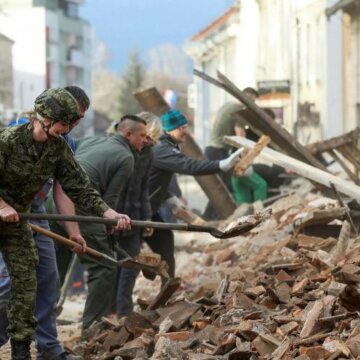- About
- Topics
- Picks
- Audio
- Story
- In-Depth
- Opinion
- News
- Donate
- Signup for our newsletterOur Editors' Best Picks.Send
Read, Debate: Engage.
| topic: | Security |
|---|---|
| located: | Croatia |
| editor: | Katarina Panić |
A dark joke circulates in Croatia these days: “Doctor, do I have sufficient iron in my body? Don’t worry, you have it more than houses built after the war.”
The negligence during the post-war reconstruction has come under scrutiny after a 6.2 magnitude earthquake hit central Croatia last week on 29 December, killing seven people and destroying many homes.
In the late 1990s, Croatia rebuilt about 150,000 houses damaged during the 1991-95 war. Alas, impoverished and destroyed, the state had no capacity to do so properly - it did not have enough money and contractors, and was in a hurry to find housing solutions for all the people displaced over the conflict.
What did the state do? Well, it introduced a new law on post-war reconstruction to avoid the existing law on construction, which was strict (just as it should be). As usual, more relaxed procedures led to more corruption. The new law made construction easier, faster, cheaper and less safe.
The government held a special session last Monday, where Prime Minister Andrej Plenković announced the investigation, saying he wants to know why some houses built after the war were of low quality.
“It is necessary to examine how and why this happened, who worked on the reconstruction, who was the supervisor, and who gave the final-use permits for the buildings,” Plenković told the media.
In the village of Strašnik, Tomislav Šubić’s house was severely damaged by the quake. Šubić recalled how his father, who was also the housebuilder, had been warning the contractors all the time during their house rebuilding in 1997. Concrete and iron were spared the most. When his father complained, they told him six feet under would be enough for him once. They also said the family might live in the house, but no one may guarantee their safety.
“It was spontaneous. A lot was stolen; no one could stop it. We were in rapture. We wanted to go back to our homes,” Šubić said to N1 television.
The post-war imperative of do it quickly and do it cheaply has come to charge now, and it is quite expensive.
The day after the strongest in the series of earthquakes, an Al Jazeera reporter went live. The screams broke out in the background. The parents of a 12-year-old girl had just found out their daughter is dead.
Image by Tanveer Shaikh
